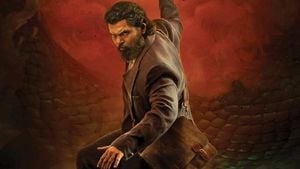On March 28, 2025, the second day of the appeal trial for Dries Van Langenhove and other members of the far-right group Schild & Vrienden took place in Ghent, Belgium. The proceedings have drawn significant attention, as they involve serious charges related to racism and incitement against minorities.
During the trial, Jos Vander Velpen, representing the Liga voor de Mensenrechten, emphasized the absence of a right to harm others through humor. "Men verwijt ons een gebrek aan humor, maar ik ben ruimdenkend," he stated, arguing that while humor can be subjective, it should not come at the expense of others' dignity. Vander Velpen referred to a controversial meme that was discussed in court, which included the text, "Wat is het verschil tussen een jood en een negerjood? Een negerjood moet vanachter in de douches staan." This example was used to illustrate the kind of harmful content that was allegedly tolerated in the group's chatrooms.
Van Langenhove's attorney, Hans Rieder, quickly contested this characterization, insisting that his client never posted such memes. Vander Velpen, however, insisted on presenting the evidence, leading to a heated exchange in the courtroom.
In a twist, it was revealed that Van Langenhove had hired a detective agency from Beernem to investigate a person named V.C., suspected of being a 'mole' who provided the television program Pano access to their closed chat groups. This development added a layer of complexity to the trial as the prosecution highlighted the lengths to which the defendants would go to protect their interests. Two weeks prior, a detective had approached V.C., who initially allowed the visit but later asked him to leave after consulting with his lawyer.
Public prosecutor Serge Malefason argued for the confirmation of the previous verdict, which sentenced Van Langenhove to one year in prison and a fine of 16,000 euros for violating racism and negationism laws, along with a ten-month suspended sentence for breaches of the weapons law. Malefason asserted, "Ik zie tot op vandaag bij de heren voor mij geen schuld inzicht. Daarom vraag ik dezelfde straf," indicating that he saw no remorse from the defendants.
He further described Schild & Vrienden as a group that aimed to become the mouthpiece for white youth and suggested that their activities included calls for weapons training and preparations for street fights. Malefason stated, "We zijn op een beerput gestoten," referring to the extensive evidence gathered during searches of Van Langenhove's property, which he described as revealing a disturbing pattern of dehumanization.
The prosecutor also criticized Rieder's defense strategy, which included allegations that the VRT and the judiciary had manipulated evidence against Van Langenhove. Rieder claimed that the VRT had hacked the private chat groups, suggesting that the case against his client was politically motivated. This assertion was met with skepticism by the prosecutor, who noted the substantial amount of material collected from the defendants' computers.
As the appeal progressed, the prosecutor defended Henri Heimans, a civil party in the case, who had been ridiculed by the defense. Malefason highlighted the emotional toll on Heimans, stating that he had been unfairly portrayed as a profiteer seeking monetary gain from the proceedings.
Malefason began his plea by recalling the infamous Pano report from 2018, which first brought Schild & Vrienden's activities to light. He described a scene from the report where Van Langenhove led a group of young people chanting derogatory slogans, illustrating the group's militaristic nature and their intent to intimidate.
Dries Van Langenhove, who has maintained his innocence throughout the trial, expressed his desire to finally speak after seven years of legal battles. He was accompanied by his attorney, who had previously refused to represent him in the initial trial, claiming the court was biased.
Vander Velpen characterized the current trial as the largest racism trial since the case against the Vlaams Blok two decades ago, highlighting its significance in the ongoing struggle against hate speech and racism in Belgium.
The courtroom atmosphere was tense as various parties awaited the opportunity to present their cases. Jihad Van Puymbroeck, another civil party, was expected to share how she became a target of Schild & Vrienden's hate campaign.
As the trial unfolded, the public prosecutor reiterated that the evidence against Van Langenhove and his associates was compelling and warranted the same punishments as previously issued. He emphasized that the defendants' lack of remorse and the gravity of their actions justified the need for a strong judicial response.
As this high-profile case continues, it raises important questions about the limits of free speech, the responsibility of individuals in positions of influence, and the ongoing impact of extremist ideologies in society. The outcome of this trial could have significant implications for future cases involving hate speech and the legal boundaries surrounding it.
In closing arguments, the prosecutor urged the court to uphold the original verdict, asserting the necessity of accountability in the face of hate and discrimination. The proceedings are set to resume as both sides prepare for the final stages of this landmark trial.





